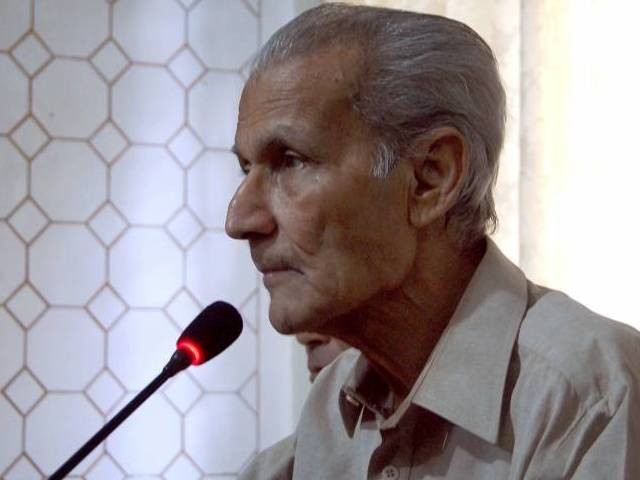Veteran politician Rasool Bux Palijo passes away in Karachi
He was declared as "Prisoner of Conscience" by Amnesty International in 1981

Nationalist leader Rasool Bux Palijo. PHOTO PHOTO: MOHAMMED JAVED
He was revered by many others as a courageous intellectual, who led several relentless political struggles and also as a symbol of undaunted political resistance.
Influenced by communist ideology, Sindh’s rights were the focus of his lifelong struggle. “Rasool Bux Palijo was Sindh’s national hero,” eloquent veteran lawyer and a former advocate-general of Sindh Muhammad Yousuf Laghari said on Thursday.
“Succeeding GM Syed, he (Palijo) was a source of courage for the people of Sindh.”
The octogenarian veteran politician, hospitalised in Karachi for a long time after suffering cardiac and respiratory complications, will be buried in a graveyard in his native village Mungar Khan Palijo in Jungshahi of Thatta district on Friday.
Rasool Bux Palijo parts ways with son-led party
Formative years
Born on January 20, 1930, in Mungar Khan Palijo, he received primary education in a local school and seminary. Subsequently, he finished his secondary schooling from Sindh Madarsatul Islam in Karachi. He later graduated in law from Sindh Muslim Law College also in Karachi.
Palijo embarked upon his political journey after joining comrade Haider Bux Jatoi’s Sindhi Hari Committee, which struggled for peasants’ rights in 1953. After a decade-long association with the committee, he joined the now-defunct National Awami Party in 1964, just as the resentment against the one-unit system was heating up.
A few years later, he grew disillusioned with NAP and joined GM Syed-led Bazme Sufiya-e-Sindh as its general secretary.
Palijo, credited with formulating the eloquent narrative for venting public resentment against the one-unit system, was jailed for nine months in 1969.
After founding the Awami Tehreek in March 1970, Palijo remained its head till his death.
He was a vociferous opponent of military operations in then-East Pakistan during the regime of Gen Yahya Khan and also in Balochistan during Zulfiqar Bhutto’s government. His strident opposition to martial law and certain political decisions by Bhutto earned him several terms of prison sentences.
He spent a total of four-and-a-half years in jail between 1969 and 1979.
Rasool Bux Palijo. PHOTO: ARCHIVES
Zulfikar Ali Bhutto sent him to prison for 11 months for defending cases of some Baloch and Pakhtun leaders whom he (Bhutto) wanted to jail.
Interestingly, Palijo was again imprisoned by the Zia regime for opposing Bhutto’s hanging.
One of the biggest and earliest public meetings that denounced and rejected General Ziaul Haq’s martial law was organised by Palijo and Fazil Rahu in Badin district in 1979.
As a consequence, he was imprisoned for six long years and the Amnesty International declared him a prisoner of conscience.
After his release, he visited Punjab as the convener of the Movement for Restoration of Democracy (MRD) to build public opinion against the Zia regime. As a result of his efforts, MRD leaders approved a resolution, suggesting that after democracy was restored, the federal government would keep only four subjects while the rest would be devolved to the provinces.
Rasool Bux Palijo parts ways with son-led party
“After Zulfikar Ali Bhutto, Palijo was the biggest political personality in Pakistan. Even his detractors appreciated his intellect, experience, depth of thoughts and farsightedness,” late Shaikh Ayaz, Sindh’s top 20th-century poet, had commented about Palijo.
In 1989, when the PPP made a political deal with the Muttahida Qaumi Movement (MQM), Palijo opposed the quid pro quo and predicted that the ruling parties would have a falling out.
In 1991 and 1995, Palijo led two long-marches against the construction of Kalabagh dam from Sukkur to Karachi.
These were among the many marches he led in his lifetime. Twice he led long marches to Karachi against Gen (retd) Pervez Musharraf and another one in 2017 to Tharparkar.
Palijo authored more than three dozen books on a variety of subjects. As visiting faculty, he delivered lectures at the Jawahar Lal Nehru University in New Delhi (JNU), Delhi University, University of Chicago, University of Cambridge, University of Sussex, University of Essex, Kingston University, University of Milwaukee, Institute of Oriental Studies in Moscow and the University of Houston, among other institutions.
He twice contested elections on a National Assembly seat from Thatta district in 1988 and 1990 from the platform of Awami National Party (ANP), which he joined in 1986.
Rasool Bux Palijo. PHOTO: ARCHIVES
Awami Tehreek
Palijo tried to turn his party, Awami Tehreek, into an institution. During his political struggles, he kept producing workers whom he personally educated and trained for social change.
At the same time, Palijo prepared workers on the intellectual, legal, social, organizational and political fronts. A large number of lawyers and judges are among his followers.
He formed lawyers, students and women’s wings of his party, the Awami Tehreek.
Sindhiani Tehreek emerged as the most vibrant wing of the Awami Tehreek. This was done at a time when women were kept away from active politics.
His son, Ayaz Latif Palijo, succeeded him as the president of Awami Tehreek, which was renamed as Qaumi Awami Tehreek in 2013. But in October 2016, differences between the father and son emerged and at a press conference, Palijo announced parting ways with his son, restoring Awami Tehreek.
Rasool Bux Palijo. PHOTO: ARCHIVES



















COMMENTS
Comments are moderated and generally will be posted if they are on-topic and not abusive.
For more information, please see our Comments FAQ